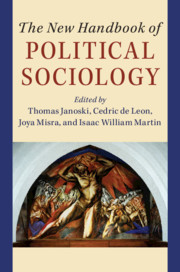Book contents
- The New Handbook of Political Sociology
- The New Handbook of Political Sociology
- Copyright page
- Dedication
- Contents
- Tables
- Figures
- Contributors
- Acknowledgments
- Introduction
- I Theories of Political Sociology
- II Media Explosion, Knowledge as Power, and Demographic Reversals
- III The State and Its Political Organizations
- IV Civil Society: The Roots and Processes of Political Action
- 22 The Challenges of Citizenship in Civil Society
- 23 Social Movements
- 24 Political Parties
- 25 Machine Politics and Clientelism
- 26 The Good, the Bland, and the Ugly
- 27 The Politics of Economic Crisis
- 28 The Influence of Public Opinion and Advocacy on Public Policy
- 29 Nationalism
- V Established and New State Policies and Innovations
- VI Globalization and New and Bigger Sources of Power and Resistance
- Index
- References
25 - Machine Politics and Clientelism
from IV - Civil Society: The Roots and Processes of Political Action
Published online by Cambridge University Press: 22 February 2020
- The New Handbook of Political Sociology
- The New Handbook of Political Sociology
- Copyright page
- Dedication
- Contents
- Tables
- Figures
- Contributors
- Acknowledgments
- Introduction
- I Theories of Political Sociology
- II Media Explosion, Knowledge as Power, and Demographic Reversals
- III The State and Its Political Organizations
- IV Civil Society: The Roots and Processes of Political Action
- 22 The Challenges of Citizenship in Civil Society
- 23 Social Movements
- 24 Political Parties
- 25 Machine Politics and Clientelism
- 26 The Good, the Bland, and the Ugly
- 27 The Politics of Economic Crisis
- 28 The Influence of Public Opinion and Advocacy on Public Policy
- 29 Nationalism
- V Established and New State Policies and Innovations
- VI Globalization and New and Bigger Sources of Power and Resistance
- Index
- References
Summary
The party “machine” is one of the few concepts that has become relevant in the scholarship of widely different political systems, with often divergent normative meanings associated with it. Although the term originated in the turn-of-the-century United States to describe the political structures that evolved in the context of mass migration, scholars have found similarities with party functioning in cases across Europe, South and Southeast Asia, Africa, and Latin America. The concept of the party machine has traveled as much geographically as it has theoretically. Starting from its implied roots in immigrant cultural ethos, it came to be employed in a more comparative, institutional, and sequential approach that took into account the timing of bureaucratization, democratization, and the mobilization of the working classes particularly across Europe.
- Type
- Chapter
- Information
- The New Handbook of Political Sociology , pp. 666 - 680Publisher: Cambridge University PressPrint publication year: 2020
References
- 1
- Cited by

